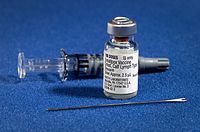
Photo from wikipedia
INTRODUCTION The public health burden caused by pathogenic Gram-negative bacteria is increasingly prominent due to antimicrobial resistance. The surface carbohydrates are potential antigens for vaccines against Gram-negative bacteria. The enhanced… Click to show full abstract
INTRODUCTION The public health burden caused by pathogenic Gram-negative bacteria is increasingly prominent due to antimicrobial resistance. The surface carbohydrates are potential antigens for vaccines against Gram-negative bacteria. The enhanced immunogenicity of the O-specific polysaccharide (O-SP) moiety of LPS when coupled to a carrier protein may protect against bacterial pathogens. However, because of the toxic lipid A moiety and relatively high costs of O-SP isolation, LPS has not been a popular vaccine antigen until recently. AREAS COVERED In this review, we discuss the rationales for developing LPS-based glycoconjugate vaccines, principles of glycoconjugate-induced immunity, and highlight the recent developments and challenges faced by LPS-based glycoconjugate vaccines. EXPERT OPINION Advances in LPS harvesting, LPS chemical synthesis, and newer carrier proteins in the past decade have propelled LPS-based glycoconjugate vaccines towards further development, through to clinical evaluation. The development of LPS-based glycoconjugates offers a new horizon for vaccine prevention of Gram-negative bacterial infection.
Journal Title: Expert review of vaccines
Year Published: 2021
Link to full text (if available)
Share on Social Media: Sign Up to like & get
recommendations!